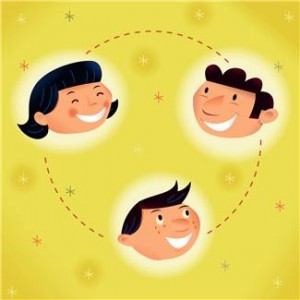Have you noticed that people like to retweet and re-post positive, inspirational quotes on social  networks? It turns out that not only the source of the quote gets a happy stamp of approval and evidence that someone reads the updates, this behavior may also boost the happiness of other network members.
networks? It turns out that not only the source of the quote gets a happy stamp of approval and evidence that someone reads the updates, this behavior may also boost the happiness of other network members.
James Fowler, a political scientist at the University of California, San Diego and Nicholas Christakis, a physician and sociologist at Harvard University, the authors of “Connected: The Surprising Power of Our Social Networks and How They Shape Our Lives” study how emotions spread across social networks. Initially, they focused on social groups of friends, family, co-workers, and neighbors, and found that:
…happy people tend to be located in the center of their social networks and to be located in large clusters of other happy people. And we found that each additional happy friend increases a person’s probability of being happy by about 9%. For comparison, having an extra $5,000 in income (in 1984 dollars) increased the probability of being happy by about 2%.
Happiness, in short, is not merely a function of personal experience, but also is a property of groups. Emotions are a collective phenomenon.
In their subsequent study of the online social networking sites, they discovered that people who smile in their profile photographs tend to have more friends and are measurably more central to the network compared to those who do not smile and who are likely to be on the periphery of the online world.
Also, according to their research, positive networks built on cooperation and altruism tend to thrive, while negative ones tend to dissolve.
In the Wired article “Self-Service: The Delicate Dance of Online Bragging,” Evan Ratliff writes:
Social networking tends to create self-reinforcing spirals of reciprocal kindness. You like my cat pictures, so I celebrate your job promotion. The incentives tend to be stacked against negativity, and in some cases implicitly discourage it. In the Facebook world, we can Like or Hide things, but there’s no Dislike button — even when you need one.
Self-enhancement – the human tendency to oversell ourselves – and mutual admiration are characteristic of social networking:
An entire taxonomy of status types has evolved for sharing some bit of good fortune. There’s one for every online persona. The straightforward celebration: “W00t!! I’ve been named to Bigtime magazine’s 100 most influential!” The ironic frame: “Shameless self-promotion: I was just named one of Bigtime’s 100 most influential people.”Or the softer sell, the just-lucky-to-be-here approach: “I am grateful to be included in this year’s 100 most influential people.” Or the mock-surprise approach: “I’m chuckling — according to Bigtime magazine, I’m a top 100 most influential person. ”
Perhaps oddest of all, considering its real-life parallel, is the retweet-without-comment: “RT: @longhornfan43: Evan Ratliff named in Bigtime magazine 100 most influential people.” Avoid this one. Imagine using a lull in dinner party conversation to announce that “a man in Texas, whom none of you know, recently told his friends I was named to the Bigtime 100. Salad, anyone?”
The take-away is that it’s OK to brag a little as long as you also take time to spread joy and celebrate others, which, in turn, makes your social network happier and stronger.
What do you think?

Leave A Comment
You must be logged in to post a comment.